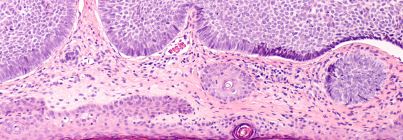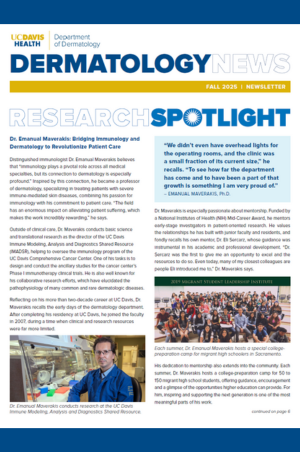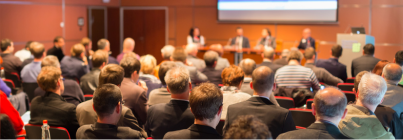Murphy Research Lab
 William J. Murphy, Ph.D.
William J. Murphy, Ph.D.
Distinguished Professor and Vice Chair of Research
Department of Dermatology
Distinguished Professor
Department of Internal Medicine, Division of Malignant Hematology/Cell Therapy, Transplantation
Research interests
Cancer immunotherapy and graft versus host disease
About the Researcher
William J. Murphy spent his postdoctoral years and early career at the National Cancer Institute (NCI) in Frederick, Maryland. After 12 years, and becoming director of basic research at NCI-Frederick in Maryland, he then joined the faculty at the University of Nevada School of Medicine, Reno (UNR) where he later became chair of the department of microbiology and immunology.
In 2008, Murphy moved his laboratory to the UC Davis School of Medicine, accepting a position as professor and vice chair of research in the departments of dermatology and internal medicine, division of hematology oncology. He became interim chair of the Department of Dermatology from 2012-2016. In 2018, he became a Distinguished Professor at UC Davis.
"The immune system can both fight cancer and promote it during chronic inflammatory conditions. Understanding the complex immunology of cancer will lead to better means of preventing and treating it." — William J. Murphy
Murphy’s laboratory studies various aspects within cancer immunology and immunotherapy, including immune responses to pathogens. Current projects within the lab are examining immunology and responses using a more systems biology approach with regard to multiple immune components and pathogen/cancer interactions.
Another focus within the laboratory is how to make preclinical modeling more reflective of the clinical scenario by incorporating human-modifying factors such as obesity, aging and prior immune exposures. His laboratory uses multiple models (including viral) and species (ranging from mouse, feline, canine, nonhuman primate and clinical samples) to integrate/link immune signatures and responses a pathogen or immunological therapy or challenge.
Murphy has more than 250 publications in cancer immunology/immunotherapy over his 30-year career, has had continuous National Institutes of Health (NIH) funding over the years and is active on multiple NIH and Department of Defense study sections.
Education
Undergraduate Education
Rutgers University, New Brunswick, New Jersey, B.S. 1984
Graduate Education
University of Texas, Southwestern Medical School, Dallas, Texas, Ph.D. 1989
Lab Location
UC Davis Department of Dermatology
2921 Stockton Blvd.
Sacramento, CA 95716
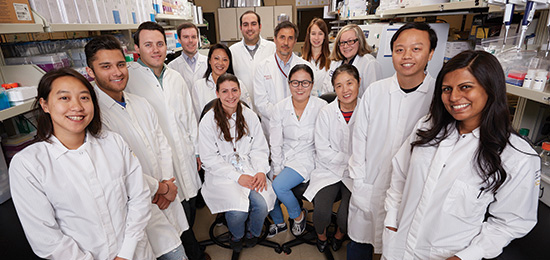
Meet the team
Left to right (standing):
Catherine Le, GSR
Jacob Mathai, Student
Steven Grossenbacher, GSR
Ian Sturgill, Junior Specialist
Jane (Qian) Chen, SRA
Ethan Aguilar, GSR
William J. Murphy, Professor
Sita Withers, D.V.M. (visiting Ph.D. student)
Monja Metcalf, SRA Supervisor
Lam Khuat, GSR
Christine Mall Minnar, Ph.D.
Left to right (seated):
Cordelia Dunai, GSR
Stefani (Ziming) Wang, GSR
Weihong Ma, SRA
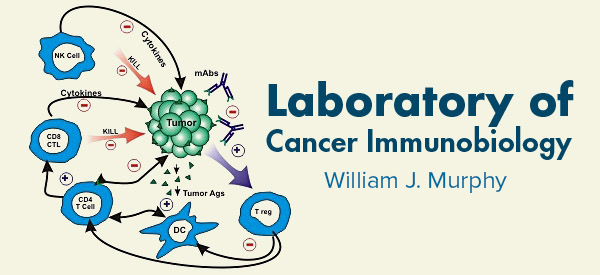
Bone marrow transplantation (BMT) is currently used for the treatment of a variety of disease states ranging from aplastic anemia to cancer. However, significant obstacles limit the efficacy of this procedure. These include: marrow graft failure, graft-versus-host disease (GVHD), immune deficiency following the transplant, and when used for the treatment of cancer, relapse of the tumor. Using both in vivo and in vitro model systems, our laboratory has been examining the immunobiology underlying these obstacles.
Natural killer (NK) cells have been demonstrated to be responsible for mediating the specific rejection of bone marrow cell (BMC) allografts in lethally irradiated mice. However, little is known concerning the nature of these cells and BMC rejection which leads to marrow graft failure. We have found that NK cell subsets exist that are responsible for mediating the specific rejection of BMC from mice bearing the appropriate MHC molecules. In addition, these NK subsets also play an important role in the normal homeostasis of hematopoiesis suggesting that it is one of their normal physiologic functions. We are currently examining the differentiation of these various subsets. We are also using activated NK cells as a means of providing additional antitumor effects when BMT is used with tumor bearing mice. We found that adoptive transfer of NK cells can provide significant antitumor effects while at the same time promoting hematopoietic engraftment and preventing GVHD in mice. We are currently examining the mechanism(s) by underlying these effects.
Our laboratory has also been examining means to accelerate immune and hematopoietic reconstitution following BMT. This would also be of use in other instances where immune recovery is desirable such as in AIDS. We have been focusing on the use of neuroendocrine hormones such as growth hormone (GH) and prolactin. They are attractive since they are relatively nontoxic when given systemically and can exert pleiotropic effects. We have found that GH can exert significant hematopoietic growth-promoting effects after in vivo administration. GH can also accelerate immune and hematopoietic reconstitution after BMT in mice. Using a human/mouse chimera model we have found that these hormones can improve human T-cell trafficking and function in vivo. We are also examining physiological role of these neuroimmune interactions.
Another problem with BMT is an EBV-induced B-cell lymphoma that can arise in immunodeficient individuals. We have found that stimulation of CD40, a molecule present on B cells critical for their development and function, can promote B-cell recovery after BMT. Using a human/mouse chimera model, we have also found that CD40 stimulation can prevent the occurrence of this EBV-induced B-cell lymphoma in vivo. Thus, CD40 stimulation after BMT may accelerate immune recovery and prevent lymphoma generation. We are currently examining the role of CD40 in hematopoiesis.
Selected Publications
Khuat LT, Vick LV, Dunai C, Collins CP, More SK, Le CT, Pai C-CS, Stoffel KM, Maverakis E, Canter RJ, Monjazeb AM, Longo DL, Abedi M, Choi E, Blazar BR, Dave M, Murphy WJ. Increased efficacy of dual pro-inflammatory cytokine blockade on acute graft-versus-host disease while maintaining graft-versus-tumor effects. Blood 2021, in press.
Khuat LT, Le CT, Pai CS, Shields-Cutler RR, Holtan SG, Rashidi A, Parker SL, Knights D, Luna JI, Dunai C, Wang Z, Sturgill IR, Stoffel KM, Merleev AA, More SK, Maverakis E, Raybould HE, Chen M, Canter RJ, Monjazeb AM, Dave M, Ferrara JLM, Levine JE, Longo DL, Abedi M, Blazar BR, Murphy WJ. Obesity induces gut microbiota alterations and augments acute graft-versus-host disease after allogeneic stem cell transplantation. Sci Transl Med. 2020 Nov 25;12(571):eaay7713.
Blazar BR, Hill GR, Murphy WJ. Dissecting the biology of allogeneic HSCT to enhance the GvT effect whilst minimizing GvHD. Nat Rev Clin Oncol. 2020 Aug;17(8):475-492.
Judge SJ, Dunai C, Aguilar EG, Vick SC, Sturgill IR, Khuat LT, Stoffel KM, Van Dyke J, Longo DL, Darrow MA, Anderson SK, Blazar BR, Monjazeb AM, Serody JS, Canter RJ, Murphy WJ. Minimal PD-1 expression in mouse and human NK cells under diverse conditions. J Clin Invest. 2020 Jun 1;130(6):3051-3068.
Murphy WJ, Longo DL. The Surprisingly Positive Association Between Obesity and Cancer Immunotherapy Efficacy. JAMA. 2019 Apr 2;321(13):1247-1248.
Wang Z, Aguilar EG, Luna JI, Dunai C, Khuat LT, Le CT, Mirsoian A, Minnar CM, Stoffel KM, Sturgill IR, Grossenbacher SK, Withers SS, Rebhun RB, Hartigan-O'Connor DJ, Méndez-Lagares G, Tarantal AF, Isseroff RR, Griffith TS, Schalper KA, Merleev A, Saha A, Maverakis E, Kelly K, Aljumaily R, Ibrahimi S, Mukherjee S, Machiorlatti M, Vesely SK, Longo DL, Blazar BR, Canter RJ, Murphy WJ, Monjazeb AM. Paradoxical effects of obesity on T cell function during tumor progression and PD-1 checkpoint blockade. Nat Med. 2019 Jan;25(1):141-151.
Dunai C, Murphy WJ. NK cells for PD-1/PD-L1 blockade immunotherapy: pinning down the NK cell. J Clin Invest. 2018 Oct 1;128(10):4251-4253.
Murphy WJ. Making a Better Hematopoietic Stem Cell - Timing Is Everything. N Engl J Med. 2018 Jan 4;378(1):89-91.
Alvarez M, Sun K, Murphy WJ. Mouse host unlicensed NK cells promote donor allogeneic bone marrow engraftment. Blood. 2016 Mar 3;127(9):1202-5.
Sckisel GD, Bouchlaka MN, Monjazeb AM, Crittenden M, Curti BD, Wilkins DE, Alderson KA, Sungur CM, Ames E, Mirsoian A, Reddy A, Alexander W, Soulika A, Blazar BR, Longo DL, Wiltrout RH, Murphy WJ. Out-of-Sequence Signal 3 Paralyzes Primary CD4(+) T-Cell-Dependent Immunity. Immunity. 2015 Aug 18;43(2):240-50.

